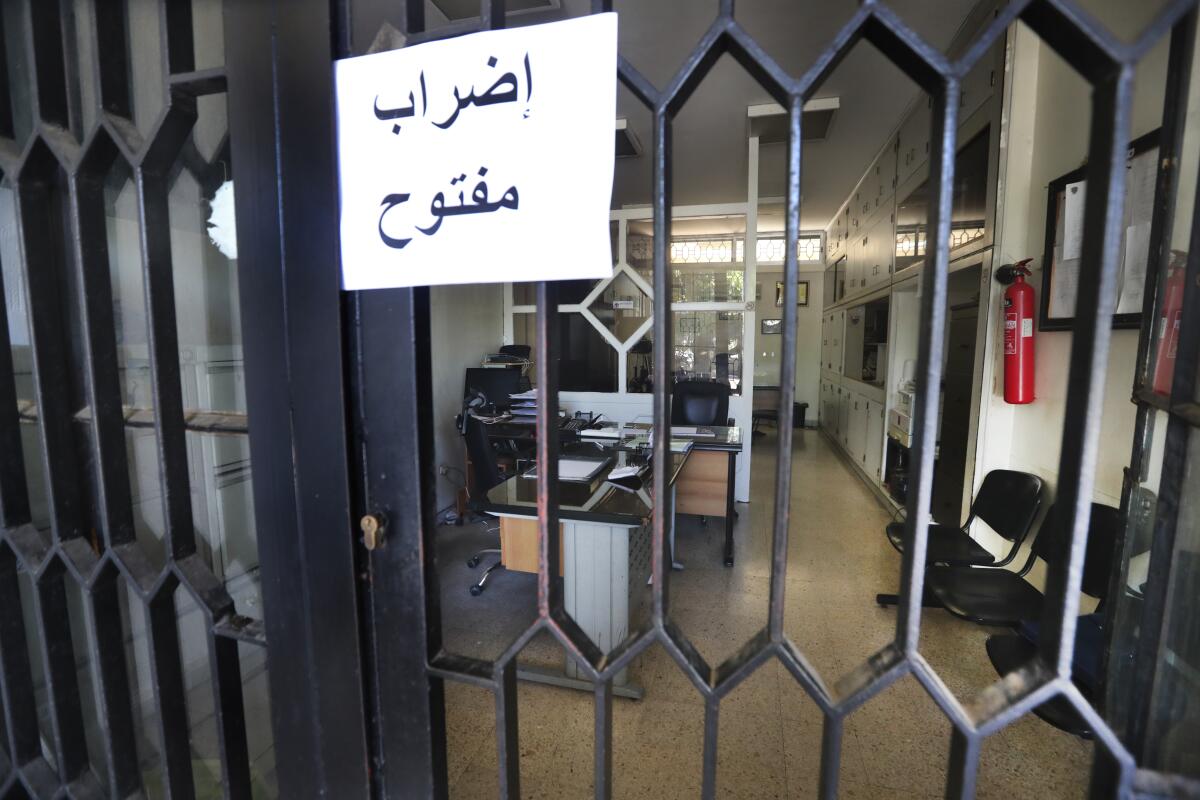A public sector strike, now in its sixth week, cripples cash-strapped Lebanon

BEIRUT — Tarek Younes was once solidly middle class and felt he helped contribute to society as an inspector in the Lebanese government’s consumer protection agency. But the country’s economic free-fall has eroded his income and civic pride.
In his desperation, Younes has joined tens of thousands of public sector employees across the country in an open-ended strike that has already lasted for six weeks.
The protest of the civil servants who form the backbone of government signals a further erosion of Lebanon’s public institutions, already struggling to pay their most basic operating expenses.
The strike gives a bleak preview of how Lebanon could sink even deeper, should officials continue to delay decisive action on key financial and administrative reforms sought by the International Monetary Fund to try to revive Lebanon’s comatose economy.
Meanwhile, the protest has further disrupted life in Lebanon, with even the most basic government services on hold. Court cases have been delayed. Identity cards, birth certificates and school transcripts are not being issued. Air traffic controllers announced that they would stop working nights in August.
Over the last year, public transportation drivers and public schoolteachers held unsuccessful sporadic strikes and protests, which they hoped would be a wake-up call for government.
Shortages of basic goods have hit Lebanon as its leaders do little to resolve a long-running currency crisis that has sparked despair and desperation.
“I don’t know how we’re thinking about economic recovery if you have that many people who were once middle class now living in poverty,” Younes said. “We are extending our hand and making compromises, but the government needs to do so as well and give us some of our rights.”
Many point to decades of corruption and nefarious financial management as a cause for Lebanon’s economic downward spiral, now in its third year. They say a handful of members of Lebanon’s ruling elite caused the world’s worst economic crisis since the mid-19th century, with three quarters of the population now considered poor.
The government has not increased wages for public sector workers since the onset of the country’s fiscal crunch in late 2019, during which the Lebanese currency lost more than 90% of its value against the dollar. On top of that, food, gasoline and medicine prices are up sharply from high inflation.
Younes, who heads the Assn. of Public Administration Employees, said public sector wages once secured a middle-class lifestyle at around $1,300 per month. But that value has rapidly plummeted to the equivalent of under $70. In a country of about 6 million people, some 350,000 Lebanese work in the public sector, and their salaries account for a huge chunk of the national budget.
Lebanon has legalized marijuana farming — already a thriving illicit industry — in hopes of giving a boost to its foundering economy.
Younes says public workers are demanding a small wage increase, better healthcare and a flexible transportation stipend to keep up with rising gasoline prices. They would still work with a major pay cut, but he says it would “at least help us get the bare minimum of a dignified life.”
With the onset of the financial crisis, Younes was scrambling as a government inspector to crack down on illegal price hikes and the hoarding of gasoline, wheat and medicine. He and dozens of other inspectors at the consumer-protection services division of Lebanon’s Economy Ministry were tasked with monitoring thousands of businesses.
Lebanon’s fractious ruling political parties have stalled in putting together an economic recovery plan and reaching a deal with the IMF for a bailout program to restructure its banks and reform its economy.
The country’s caretaker government under Prime Minister Najib Mikati says it can’t afford the workers’ demands but offered temporary cash bonuses and a slightly improved transportation stipend. Some employees have returned to work, but Younes said the majority still have their doors closed.
Breaking News
Get breaking news, investigations, analysis and more signature journalism from the Los Angeles Times in your inbox.
You may occasionally receive promotional content from the Los Angeles Times.
“What will [the bonuses] do? Will it help you get to work, pay your electricity bill or your phone bill?” Younes said. “You can do one of these, but then you can’t feed your children, take them to school or get them healthcare.”
Lebanon’s public sector was weak even before the economic crisis began, said Sami Zoughaib, an economist at the Beirut-based think tank Policy Initiative. He described the sector as bloated, inefficient and marred by political patronage and corruption.
“The elite used public employment as a tool in their clientelistic practices to garner political support,” he said. “A bunch of them are ghost employees who are there only to get their checks but never show up to work.”
Trimming the public sector payroll might help the country’s budget sheet but may also cause backlash, affect political loyalty and worsen Lebanon’s already-alarming poverty rate. The cash-strapped country has no viable social protection programs to soften the blow.
Many well-off Lebanese who escaped their country’s economic tailspin for a new life in Cyprus say the transition has been a roller coaster.
“If you fire 20% or 30% of the workers, how do you make sure they survive? What kind of social protection measures are you using?” Zoughaib said.
Zoughaib isn’t optimistic that things will change.
“They will continue to kick the can down the road without harming themselves politically, with some patchwork,” he said of the stalled government. “This is harmful for both the public sector and largely for the Lebanese public, which needs public institutions.”
More to Read
Sign up for Essential California
The most important California stories and recommendations in your inbox every morning.
You may occasionally receive promotional content from the Los Angeles Times.













